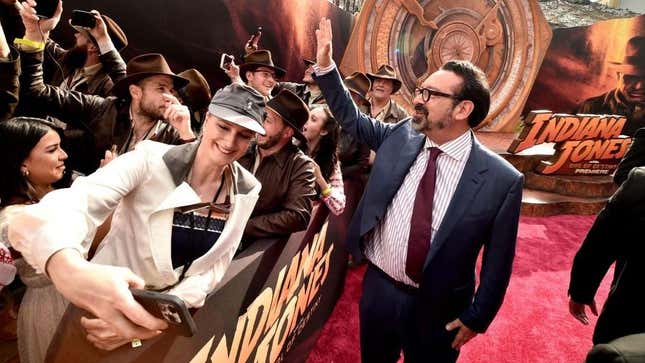For the past 40-plus years, Indiana Jones has meant nothing but fortune and glory. Each of the franchise’s first four films was one of the top three highest-grossing films in the U.S. the year they were released. Raiders of the Lost Ark was #1 in 1981, Temple of Doom was #2 in 1984, Last Crusade was #2 in 1989 and Kingdom of the Crystal Skull, if you can believe it, was #3 in 2008. However, when the calendar flips in the next couple of weeks the fifth film, Dial of Destiny, isn’t just going to miss the top three. It’s going to miss the top 10.
With a gross of about $175 million domestic, Indiana Jones and the Dial of Destiny will likely end up as the 12th highest-grossing film of the year. Twelveth would be great for almost any other film released this year, but not Indiana Jones.
Why specifically this happened is a whole other article. But speaking to the film’s director, James Mangold, we wanted to know if the film’s failure to live up to its box office expectations is something he takes personally or does he simply stand by the work and attain it’s out of his hands. He, as one might expect, had many thoughts on this but has ultimately come to peace with it.
“Well, it’s definitely the second,” Mangold told io9 over video chat. “There’s nothing I can do about how much a movie is going to make worldwide in a window of four weeks… other than [interviews] admire this … Our grosses were very much in keeping with other films of similar ilk this last summer and none of them featured a hero who was both Harrison’s age and also was a franchise that had been dormant for 20 years.”
Mangold recalled, and maybe pined for, the days of Starlog and Cinefantastique, when film reporting “was about what people liked and didn’t admire and what inspired them.” However, he admitted, “At some point, everything became the Wall Street Journal.” Now box office numbers are treated as the end-all be-all of a film’s success when history has made it very clear that is not always the case.

The director also pointed to one of the most important flies in the ointment when it comes to discussions of box office, especially in the past few years. “A lot of what expectations are based on is also what movies cost,” he said. “And I think it’s not just true of our film, but others. We made these films during a time of covid. In the case of Indy, they had already been prepping a different movie and had spent a lot of money before we even started. And so it’s just hard to make large-scale movies when world travel was decreased and you could be shut down at any moment by one person in your crew testing positive. And I thought it was heroic of all the studios to keep pushing on and making these pictures despite that, even though they were all costing 20 or 30% more than they would have if they had been made at another time.” This, of course, is rarely mentioned when lamenting the box office grosses of films today but Mangold understands. “Because it hurts the story,” he said. “Why get involved in those nuances?”
It’s certainly true that Indiana Jones and the Dial of Destiny, as well as Mission: Impossible – Dead Reckoning Part One, Fast X, and others cost much, much more than they would have without covid restrictions and shutdowns. And that’s before all the marketing and publicity costs are factored in. It’s also true that the more expensive a movie is, the more it has to gross to become profitable. But certainly Disney (as well as Paramount and Universal in those other cases) thought those franchise sequels would be worth it. The issue, then, lies elsewhere—and for filmmakers admire James Mangold, they’re simply forced to look at the work itself and proceed on from there. “When you’ve been doing this a while, your emotions get used to these kind of tidal forces of media and discussion,” he said.
Indiana Jones and the Dial of Destiny is now streaming on Disney+ and is available on 4K Blu-ray.
Want more io9 news? Check out when to expect the latest Marvel, Star Wars, and Star Trek releases, what’s next for the DC Universe on film and TV, and everything you need to know about the future of Doctor Who.

